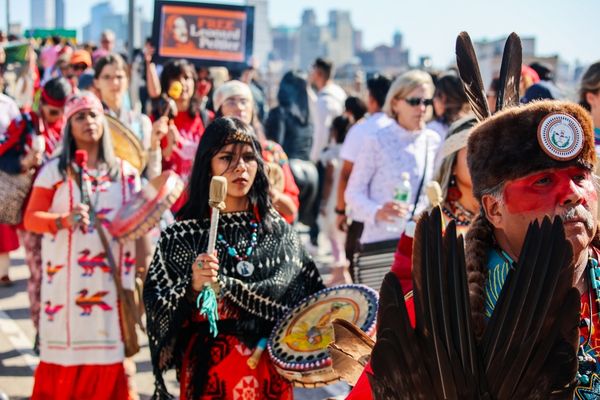
- Details
- By Native News Online Staff
The Brooklyn Bridge was filled with a sea of red — shirts, regalia, and handprints — on Oct. 15 for the second annual walk to honor Missing and Murdered Indigenous Women and Children.
The walk, organized by New Jersey-based non-profit, Antinaco, drew up to one hundred supporters, allies and spectators to raise awareness about Missing and Murdered Indigenous Peoples, said the group’s executive director Olga Sher.
“We pretty much covered the bridge at one point,” Sher told Native News Online this week. “People just joined us in the process—strangers who were passing by. Many people stopped and asked us questions. We had posters with calls to action, so those were good conversation starters.”
The event was preceded by ceremony and speeches, including by Bitahnii Wayne Wilson (Diné), a staff member of Antinaco, who lost his daughter to human trafficking. Nakota, Lakota, and Anishinaabe tribal members also spoke.
Once the group crossed the bridge, they merged with the Ramapough Lenape Tribe in Madison Square Park. There, the state-recognized tribe was hosting its inaugural Indigenous Peoples of the Americas Parade.’
“The ending was really like a celebration of both events,” Sher said. “We are already planning next year ... for more lost voices to be heard.”
More Stories Like This
Native News Weekly (August 25, 2024): D.C. BriefsUS Presidents in Their Own Words Concerning American Indians
Navajo Mother Welcomes Federal Charges in 2020 Killing of Her Son
Native News Online Launches Year-End Campaign to Support ‘Warrior Journalism’
Native News Online’s Year-End Live Stream - Recap of 2025: A Night That Brings Indian Country Together
Help us defend tribal sovereignty.
At Native News Online, our mission is rooted in telling the stories that strengthen sovereignty and uplift Indigenous voices — not just at year’s end, but every single day.
Because of your generosity last year, we were able to keep our reporters on the ground in tribal communities, at national gatherings and in the halls of Congress — covering the issues that matter most to Indian Country: sovereignty, culture, education, health and economic opportunity.
That support sustained us through a tough year in 2025. Now, as we look to the year ahead, we need your help right now to ensure warrior journalism remains strong — reporting that defends tribal sovereignty, amplifies Native truth, and holds power accountable.
 The stakes couldn't be higher. Your support keeps Native voices heard, Native stories told and Native sovereignty defended.
The stakes couldn't be higher. Your support keeps Native voices heard, Native stories told and Native sovereignty defended.
Stand with Warrior Journalism today.
Levi Rickert (Potawatomi), Editor & Publisher


